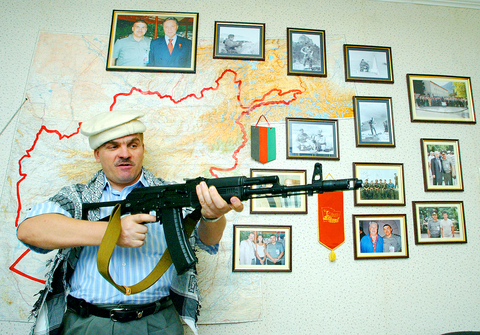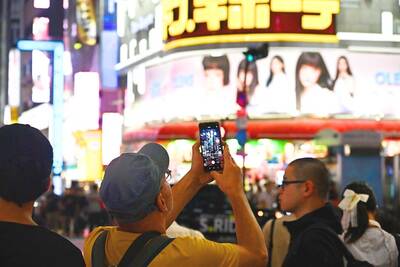When Sergei Pashevich looks at the map of central Asia, he sees a chessboard on which a replay of the Great Game is unfolding, with oil, trade and the war on terrorism as the big global issues at stake.
The Great Game, a term invented to define the imperial rivalries and ambitions of 19th century Russia and Britain, now applies, in Pashevich's view, to a new, post-9/11 struggle for influence that is pitting Russia and China against the US.
"Right now the whole Central Asian region is a field for geopolitical games," he says.

PHOTO: AP
The stocky, square-shouldered Kazakh was decorated for bravery in the Soviet war against US-backed Muslim rebels in Afghanistan. Now he is one of several big-picture analysts in Almaty, the main city of Kazakhstan in the heart of Central Asia, who are poring over this new political and diplomatic battlefield.
Another is Venera Galyamova, a short, intense-eyed woman with a deep knowledge of Central Asia and its neighbors.
A researcher at the Kazakhstan Institute for Strategic Studies, she sees Central Asia becoming "the arena for the battle between the United States on one side and China and Russia on the other side. For China, influence in the region also means asserting itself as a global power to rival the United States."
China's exploding economy thirsts for oil, and within two decades Kazakhstan is expected to be a leading oil exporter. Russia has plenty of oil, but its clout in the region has diminished. It lost control of Kazakhstan and the other Central Asian republics when the Soviet Union collapsed, and it has suffered further losses of influence lately in Georgia, Ukraine and Kazakhstan's neighbor, Kyrgyzstan.
The US, meanwhile, has an interest in the oil, as well as the bases it runs in Uzbekistan and Kyrgyzstan to back up its operations in Afghanistan to the south.
Here are some of the signs the analysts in Almaty are paying attention to:
In July, the Shanghai Cooperation Organization, made up of China, Russia and nearly all the central Asian states, asked the US to set a deadline for quitting the bases.
Additionally, this month, Russia and China, former military and ideological enemies, have put their armies together for the first time in military exercises on the Shandong Peninsula and the Yellow Sea.
Meanwhile, on May 25, China gave a red-carpet welcome to the president of Uzbekistan, just days after his bloody crackdown on protesters killed hundreds and raised serious questions about the human rights record of a valued Washington ally. China congratulated President Islam Karimov on his handling of the riot.
Military bases
The future of the US base in Uzbekistan is finite while in Kyrgyzstan it remains cloudy, given to contradictory statements by the hosts. But the Shanghai group's resolution caught the US off-guard.
US Secretary of State Condoleezza Rice said the bases were still needed for the war against terrorism in Afghanistan, and speculated that the smaller central Asian countries signed on to the resolution at the behest of their larger neighbors, Russia and China.
Washington wouldn't give a deadline for withdrawing, so at the end of last month Uzbekistan President Islam Karimov set his own -- 180 days.
"It was China that wanted the deadline," sai d Galyamova, of the government-run Kazakhstan Institute for Strategic Studies.
"Beijing believes that the bases are to be used not only for fighting terror but also for the purposes of reining in an expansionist and politically ambitious China," she said.
Dosym Satpayev, who heads the privately run Assessment Risk Group in Almaty and has written a book on Chinese-Kazakh relations, says Washington's presence has been a disappointment to the post-Soviet strongmen ruling the Central Asian republics. Having initially welcomed the Americans, they now see Washington's preoccupation with human rights and democracy as a threat to their survival, and find China's policy of non-interference appealing, he said.
"The Kazakhstan government really worries that US influence will bring political change to our country," Galyamova said.
Kazakhstan President Nursultan Nazarbayev is thought capable of winning a fair presidential election, expected to be held in December, but he is a nervous ruler. He recently approved laws that punish Kazakhs who participate in unregistered political or religious organizations. They also punish foreign organizations that help them -- a move aimed at Western groups working to spread democracy.
China woos Kazakhstan
Last month, Nazarbayev and Chinese President Hu Jintao (胡錦濤) formally affirmed their "strategic partnership," signed several trade deals and agreed to study building a railroad from Kazakhstan's portion of the oil-rich Caspian Sea to western China. A 988km pipeline to carry Kazakh oil to China is due for completion in December. Kazakh-Chinese trade, which totaled US$4.5 billion last year, is growing.
China's inroads into this country four times the size of Texas take many forms, says Rashid Dyusembaev, editor-in-chief of Kazakh Monitor, an independent English-language newspaper.
For instance, he said, Chinese farmers are taking long-term leases on farmland. Also, he said, "China has the headwaters of the two main rivers that supply water to Kazakhstan and has been diverting the water channel and can hold the water hostage."
China's interest in Central Asia isn't just economic. It has its own restive Muslim population, the Uighurs, in its far west, bordering on Central Asia. Beijing claims Uighur militants are part of an international Islamic terrorist network.
So with China facing a separatist threat, the US running bases in two Central Asian countries and Russia maintaining forces in two Central Asian states, the superpowers have "military forces cheek by jowl in a sensitive region of the world," the Economist Intelligence Unit's 2005-06 country profile of China observes.
Satpayev adds: "It is clear that China has taken a page from the American method of influence. First comes the investment, next comes the influence and next comes the soldiers."

BRUSHED OFF: An ambassador to Australia previously said that Beijing does not see a reason to apologize for its naval exercises and military maneuvers in international areas China set off alarm bells in New Zealand when it dispatched powerful warships on unprecedented missions in the South Pacific without explanation, military documents showed. Beijing has spent years expanding its reach in the southern Pacific Ocean, courting island nations with new hospitals, freshly paved roads and generous offers of climate aid. However, these diplomatic efforts have increasingly been accompanied by more overt displays of military power. Three Chinese warships sailed the Tasman Sea between Australia and New Zealand in February, the first time such a task group had been sighted in those waters. “We have never seen vessels with this capability

A Japanese city would urge all smartphone users to limit screen time to two hours a day outside work or school under a proposed ordinance that includes no penalties. The limit — which would be recommended for all residents in Toyoake City — would not be binding and there would be no penalties incurred for higher usage, the draft ordinance showed. The proposal aims “to prevent excessive use of devices causing physical and mental health issues... including sleep problems,” Mayor Masafumi Koki said yesterday. The draft urges elementary-school students to avoid smartphones after 9pm, and junior-high students and older are advised not

Philippine President Ferdinand Marcos Jr has fired his national police chief, who gained attention for leading the separate arrests of former Philippine president Rodrigo Duterte on orders of the International Criminal Court and televangelist Apollo Carreon Quiboloy, who is on the FBI’s most-wanted list for alleged child sex trafficking. Philippine Executive Secretary Lucas Bersamin did not cite a reason for the removal of General Nicolas Torre as head of the 232,000-member national police force, a position he was appointed to by Marcos in May and which he would have held until 2027. He was replaced by another senior police general, Jose

POWER CONFLICT: The US president threatened to deploy National Guards in Baltimore. US media reports said he is also planning to station troops in Chicago US President Donald Trump on Sunday threatened to deploy National Guard troops to yet another Democratic stronghold, the Maryland city of Baltimore, as he seeks to expand his crackdown on crime and immigration. The Republican’s latest online rant about an “out of control, crime-ridden” city comes as Democratic state leaders — including Maryland Governor Wes Moore — line up to berate Trump on a high-profile political stage. Trump this month deployed the National Guard to the streets of Washington, in a widely criticized show of force the president said amounts to a federal takeover of US capital policing. The Guard began carrying